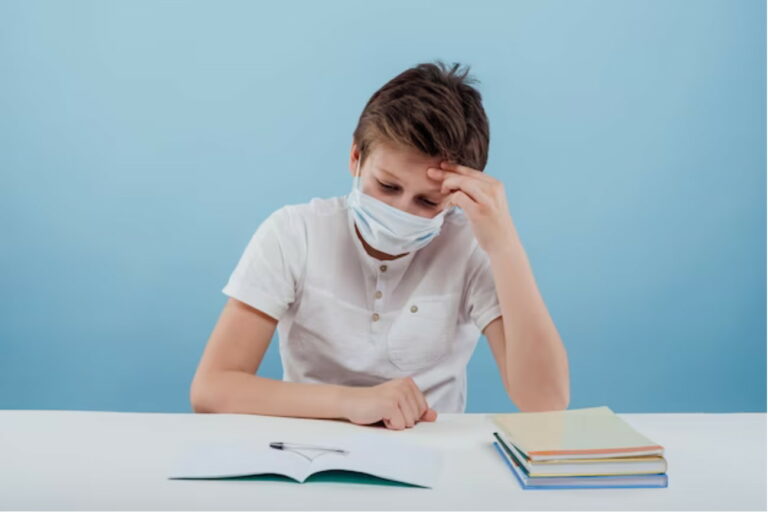As if academic issues weren’t enough for young adults in schools, they also have to deal with health issues on a daily basis. Thus, students often struggle with a variety of health issues most commonly happening in closed or high-pressure environments. Let’s see what the 7 most common health issues among students are and how to recognize and cope with them.
Cold
There is no secret about the most common health issue among students. Of course, being trapped indoors for hours while sharing the environment with dozens, if not hundreds, of other people leads to induction spreading. A cold is the most common viral infection to exist. Fortunately, its symptoms are not severe and don’t last long. The virus usually affects the nose and throat first. Bed rest and lots of hot liquids should help students recover within several days. It’s best to stay isolated during the sickness since it is easily spread around the campus.
Food Poisoning
Young people are notoriously bad eaters. They often either lack time for cooking or skills in the kitchen or money to purchase the best products or healthy takeouts. As a result, students often eat on the go, prefer fast food or street food over cooking at home, and overall obtain rather careless eating habits.
Food poisoning may happen at any time a person eats contaminated or spoiled food without knowing. In this case, the symptoms include abdominal pain, nausea, fever, vomiting, diarrhea, etc. Such symptoms may last from several hours to several days. Plenty of liquids and bed rest are recommended. If symptoms don’t seem to fade after several hours to a day, a person should seek medication help.
Sprains
Sprains are surprisingly very common among young people. A sprain can happen during any type of physical activity, from exercising in the gym to taking the stairs or simply walking. Student-athletes are most likely to suffer from sprains due to their rigid routines and excessive physical activities. However, one can sprain an ankle (the most common sprain case) while walking and staring at the phone on the way to a class.
Fortunately, a sprain often heals within two weeks, and it doesn’t require medical intervention. Reduced activity in the affected joint is highly recommended. You can recognize a sprain by swelling, pain, limited movement, and, in rare cases, bruising or redness.
Depression
Over the past decades, more and more young people are reportedly suffering from depression. It is a serious mental health disorder that affects one’s quality of life, physical health, work performance, and relationships. In severe cases, depression can be the cause of suicidal attempts. That’s why depression should never be taken light-heartedly.
That’s also why students should rather read pay me to do your homework reviews and seek professional help in the academic realm, too. One needs time to heal from depression and find joy in life. Handling some of the homework to professional writers will help students progress faster.
Stress and Anxiety
Unfortunately, schools often create and nourish rather stressful environments. At the same time, young people are most prone to suffering from anxiety disorders. They are less equipped with tools and techniques to cope with pressure and stress. Usually, such mechanisms come with experience. Yet, students have to deal with numerous tasks and new duties all while figuring out themselves. It’s a lot to handle for young minds.
The symptoms of anxiety include the difficulty of breathing, irritation, insomnia, restlessness, a sense of panic, sweating, lack of focus, tiredness, and more. These symptoms are so common that many young people accept these feelings as a norm and don’t seek help or ways to cope with these conditions.
Sleep Difficulties
Due to stress, academic overburden, potential burnout, and active social life, many students may struggle with their sleeping routine. Some pull all-nighters a few times a week, others party till dawn, and a few students may have difficulties falling asleep due to all the pressure they endure during the day.
Although the reasons may vary, the consequences of sleep deprivation are always similar. Students start to feel fatigued, suffer from mood swings and irritation, drop in focus and concentration, and have a lower immune system. In fact, sleep deprivation can get to the point where young people start to get sick more often, fall into depressive states, have a significant drop in their school performance, and risk getting into car accidents or injuring themselves in sports.
Sexual Health
College can be a wonderful time in students’ lives. They learn to be independent adults, accept new responsibilities, make new friends, and expand their networks and interests. Of course, dating is also a big part of college life. Yet, not many young people come prepared to face this part of life responsibility and with full consciousness.
As a result, college can also become a period of sexual health issues. Little awareness of sexual life, diseases, and multiple ways to protect oneself may lead to STIs and related disorders. Some of such diseases are easily treated with medications like antibiotics. Others may cause life-long consequences. That’s why sex education is so essential at a young age.
